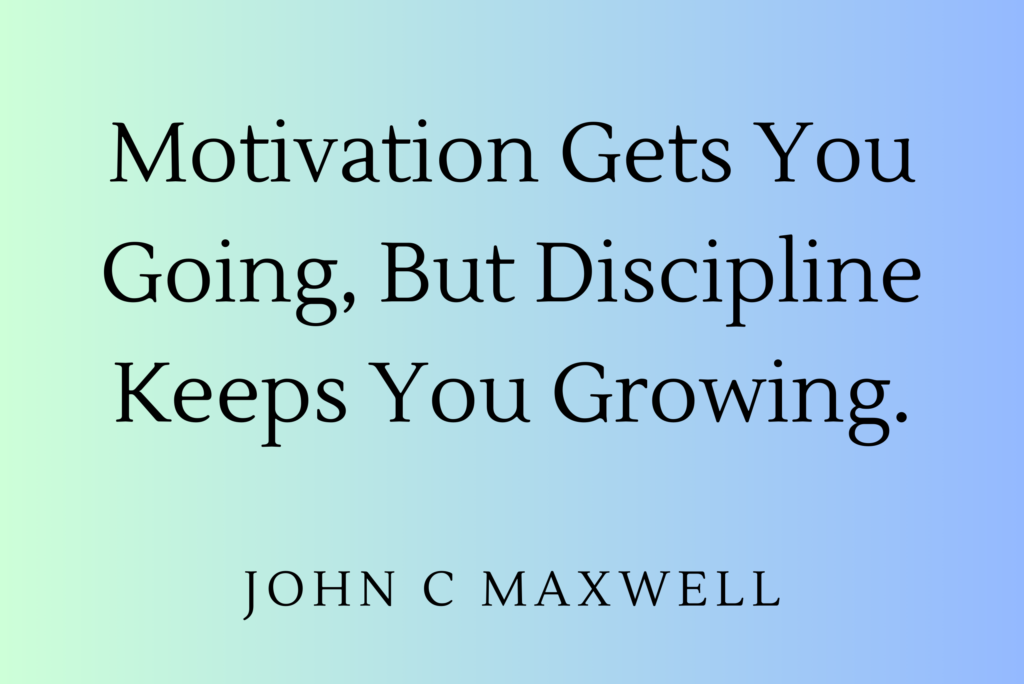Motivation refers to all those driving forces that push you toward the struggle to achieve your desired goals and objectives. It might include all the basic pre-set action plans, guidance, listening to speeches, searching for expert people in the same niche, etc.
On the other hand, Discipline is the constant practice of repeating the same action to achieve success or strictly following the pre-set blueprints to be on the mark for a game plan that you wanted within the predicted time frame.
Now the question is, which one is more important, motivation or discipline? And which one should you rely upon to get what you want in the end?
An unbiased debate between motivation VS discipline – which one is better?
To provide a satisfactory answer to the question of which one is better, we have developed this unbiased debate of motivation vs. discipline. In this post we discuss all the basics, differences, types and other essential information you must know to understand the dynamics of both sides of the argument. So, without further discussion, let us jump into the content.
What Is Motivation?

The well-known author and psychologist Patrick King, in his book Motivation Triggers: Psychological Tactics for Energy, Willpower, Self-Discipline, and Fast Action, defines motivation as the collection of all the psychological forces that let us interact, organize, and persist in behaviors that lead us to the achievement of goals.
Hence, motivation can be defined as the approach you refer to all those day-to-day activities that convince you to welcome change with continuous struggle.
Example: For instance, you are a software engineer living in a one-bedroom apartment, traveling from public transport, eating regular food, and wearing unbranded clothing. At the same time, another colleague who is also a software engineer has a better job and other facilities than you.
Thus, they live in a 7-bedroom bungalow with a private garden, drive a Mercedes, earn more than you, live a luxurious life, and wear expensive clothing that you wish to have. Now, the normal day-to-day activities of that person will become highly valuable and a source of motivation for you.
Thus, it pushes you towards searching for a better job, polishing your skills, and doing all the other things to level up your lifestyle.
There are two significant types of motivation listed as follows.
1: Intrinsic Motivation
The first and the foremost type is called intrinsic motivation. It is assembling all those things that motivate you based on internal rewards not tangible or seen by the outside world.
It includes self-improvement, feeling good by helping others or developing valuable skills to help you. For instance, you might get motivated by receiving a promotion in your job as it will strike your hunger to excel further in your area, leaving your subordinates behind.
This type of motivation is one of the most sustainable, allowing you to keep going for a longer period without getting demotivated.
Types of Intrinsic Motivation
- Competence: people are motivated by the process rather than the end reward. For instance, getting appreciated by the parents for studying 2 hours every day.
- Attitude motivation refers to the cultivated attitude towards changing your current situation for a better one.
- Achievement motivation: People are driven by the desire to achieve their pre-set end goals.
2: Extrinsic Motivation
Extrinsic motivation is based on external rewards seen by outside factors and tangible. The aspects related to extrinsic motivation are more common as they influence it in humans.
Extrinsic motivation can also be harmful at times. For instance, the most common extrinsic motivation is a chef preparing delicious meals by putting in effort with the fear of being fired. This shows that extrinsic motivation is complex and can lead to a negative attitude toward success.
Hence, Discipline is more related to personal development and fosters a sense of reliability, accountability, and responsibility toward oneself. It helps individuals stay focused on their principles and end goals, avoid other distractions, and overcome obstacles with positive mindsets. It also helps shape behaviors and maintain societal order.
Example: For instance, you are a front-line worker or first-level manager in a firm who wants to attain the department’s general manager position. Now, it would only happen on its own or over time. Instead, you would need to polish your skills by studying further, performing well and better than others, and polishing your skills daily.
This will demand you to sacrifice many other things, such as compromising your sleep hours and studying instead of watching your favorite TV series. But to honor your commitment, you will constantly need help to achieve the results.
What is Discipline?
In his book Principle-Centered Leadership, Author Stephen Covey defines Discipline as the ability to make and keep promises to hone commitments.
This tells us that discipline is someone’s ability and skill to do the right things at the right time to ensure long-term gain. It demands short-term sacrifices to achieve the end goals. For instance, getting up daily at a specific time to reach school, college or university is a clear example of being disciplined.
Let’s look at various types of discipline below.
1: Internal or Self-Discipline
This is the ability of a human being to regulate their control over their nerves. Even though they have nothing or anyone standing over their heads forcing them to do anything, they are so determined by their internal abilities and desires that they will still gain control over their nerves and emotions without any external influence.
Internal or self-discipline is related to one’s actions, thoughts, and emotions. For instance, setting an alarm to get up on time can help you start your struggle to succeed.
Examples
- Following a daily exercise routine
- Eating healthy even though you like to eat junk
- Studying 8 hours a day and not playing or wasting time in any other way.
- Reading a certain page of a book every day to finish it on time.
2: External Discipline
External Discipline refers to all the rules and regulations imposed by any higher authority to keep you disciplined. This includes the parents, employer, teacher, and other social norms.
External Discipline develops intangible and unseen boundaries across you to ensure your adherence to the pre-set disciplinary rules. However, it can hurt some people’s minds, making them rebellious.
Examples of external Discipline include
- Rules of the school related to timings, policies, dress code, etc
- Workplace regulations for the employee
- Legal constraints developed by the law enforcement authorities
- Social norms of the society you live in
While internal or self-discipline is widely accepted and appreciated by people, external Discipline might seem like a vague term and idea to some people to adopt in real life for the sake of their goal acquisition.
It happens because people with external Discipline associate the idea of being controlled or forced by someone to do something. However, this thinking needs to be corrected, as external Discipline can lead you to massive success when used correctly. Understand the phenomenon with this example.
You are an employee in an organization selling rubber tubes to the customer. You want to level up your position in the department from the seller to the manager. For this, you are ready to make the necessary compromises in self-discipline. You set the alarm, spent time on skill development, and attained all the capabilities of a good manager.
However, you should have paid more attention to the external Discipline. That means you never reached your office on time, did not dress up as required, and did not adhere to any policies described by the organization. In such a case, will your self-discipline benefit you in any way?
The answer is a big NO because no matter how hard you have worked, it has remained hidden inside you, and no one has been able to see the change you have tried to bring.
Difference between motivation and Discipline
To seek out the best option among motivation and Discipline, it is imperative to understand the difference between both. Here are all the factors that differ motivation from Discipline
1: Nature of Origin
Although motivation and discipline are closely related, they are very different in their own right. Motivation is a driving force stemming from within a person’s internal desires, experiences, and aspirations, which are sometimes disturbed or included by outside stimuli.
Thus, motivation compels individuals to initiate actions toward their goal setting and develop strategies to achieve them. It serves as a spark for someone in pursuit of their dreams.
Discipline comes after goal setting and before goal accomplishment. It surrounds the person’s self-control and determination to stick to their plans for the goals they have set. Thus, it is the guiding force for maintaining focus and consistency in the struggle.
That means while motivation stems from the struggle for change, Discipline ensures that it continues without failure until the final goals and objectives are met.
2: Fluctuation and consistency
Motivation is like a wave, which is higher at some points and lower at other points, depending upon one’s circumstances and mood. For instance, sometimes, we are super excited and overwhelmed by the idea of being healthy and starting a healthy diet.
Nevertheless, the other day, we felt like sitting all day in bed and eating junk. This is what motivation looks like—inconsistency and fluctuation.
However, once we have decided on something and stick to it, that is called discipline, which is more sustainable than motivation and goes a long way. It is all about making a commitment to yourself and fulfilling it no matter what happens or what obstacles come in between.
3: Starting vs Staying on Track
Motivation is something you need as the starting point. It gets us through the difficult decision of starting something that seems very difficult to us. However, as all the initial excitement fails, we need a steady hand to keep moving, which is Discipline.
Discipline ensures we are equally focused on our goal as we were on the starting day.
Motivation is the first push we need, yet Discipline acts like a glue that gets us stuck to the plan till the end.
4: Source
Motivation hails from the internal desire of the person to achieve something that seems attractive to them for a more extended period. It is driven by their intrinsic needs and aspirations to become something they are not.
However, multiple external factors, such as rewards and encouragement, greatly influence motivation.
Conversely, Discipline involves imposing rules and regulations on oneself to hold oneself accountable for successes and failures. It can also be influenced by external factors such as social norms, pressures, regulatory standards, etc.
5: Outcome
Motivation and Discipline have entirely different approaches to goal attainment. Motivation is the shining lamp on the desired destination. For instance, when we try to be the next top dog at our school, we continuously think about all the rewards and praise we will get after accomplishing the goals.
Motivation is the fuel everyone needs to keep themselves pushing towards their aspirations. Thus, the focus remains on the goal, while other things seem less important and secondary.
On the other hand, Discipline emphasizes sticking to a routine and taking short yet consistent steps to move toward your end goal continually. It does not emphasize the one-time desired or immediate results.
Hence, motivation is an example of keeping your eye on the prize, but discipline ensures that everyone who is motivated about something constantly tries to achieve it.
6: Emotion vs. Action
Motivation and Discipline work with different psychological mechanisms. Motivation is closely related to the emotions and feelings of a human being.
For instance, a child living in poverty becomes motivated to study and become rich to change his family’s fortune. Thus, the emotional state fuels the individual to take timely action and inspires them to set up their goals for the future.
At the same time, discipline is more focused on actions and does not pay attention to how the other person feels at that time.
Thus, no matter how much you are about doing today’s work, or perhaps you are feeling extremely low, the rules of discipline say you must do a specific amount of work each day to achieve success in the planned time.
7: Inspiration
Motivation usually seeks help from external factors such as praise, reward systems, and achievements to develop in a human being’s mind.
These external stimuli boost someone’s morale and motivate them to do additional activities to pursue their goals for the future.
Discipline is also enforced externally through rules and regulations that can be inside the human mind or influenced by the outside world. However, these are only influences; no force can discipline anyone until they have the internal desire to be one.
Which One Is More Important?

Now that we know the basics, types, and the key differences between Motivation and Discipline, it is finally time to answer the question, “Which is more important?”
Well, there is no single or predetermined answer for this question because both are equally important and go hand in hand in most cases. The car’s steering wheel becomes useless if the engine is not working. Similarly, the engine is only used once the steering wheel works properly.
To accomplish any goal, you need to contribute motivation and discipline. If only one factor is missing, the other one automatically becomes invaluable and vague.
Motivation provides the initial push one needs to drive themselves towards success. It is an initial igniting force that propels us with enthusiasm and determination. Thus, it acts as a catalyst for action and inspires you to take a step ahead in pursuing your dreams and attaining goals.
However, it does not do anything on its own. Instead, motivation is deeply dependent upon the disciple, who is the guiding force towards accomplishment. In essence, motivation is the direction seeker who fulfills our aspirations, and discipline keeps us moving- no matter how fast or slow we are towards attaining our objective.
The same is why motivation without discipline is nothing but a wave of feelings that come, reach their peak, and fade instantly. Similarly, discipline without motivation is equal to the existence of a non-directional and vague passion.
Tips for Balancing Motivation and Discipline
Have A Clear Goal
It is essential to have a clear goal. A clear goal lends a helping hand to keep a firm balance between Discipline and motivation. It can make a massive difference in reaching the goal.
This is because when we set a clear goal without any confusion, it helps to work on it with complete focus, motivation, and Discipline. So, whenever you set a goal, remember to have a clear vision to make your way to the goal more efficiently.
Make A Plan
Sometimes, keeping yourself on track with the goal gets tricky due to the unplanned journey causing a mess. It is highly suggested that you create an excellent plan to keep yourself on track while being motivated and disciplined.
A well-designed plan keeps the one more focused and disciplined throughout the journey. Design a manageable plan. By breaking the plan section by section and following the pattern step by step, a person can lead the way in a manageable manner.
Another thing that works well is to break the plan into smaller tasks, making the person more manageable with his created plan.
Finding Your Motivation
Have you ever felt like throwing in the towel, where nothing you do seems right? Often, this disenchantment stems from a lack of motivation, either because the task at hand doesn’t inspire you or because the hurdles along the way drain your energy. Losing motivation means losing the zest for our endeavors. It’s crucial, then, to take whatever time you need to discover what truly ignites your passion. Identify the factors that keep you driven. This could be anything from the personal satisfaction of achieving a goal, to the intrinsic value of the goal itself, the aspiration to assist others, or any number of personal desires and needs. By pinpointing what excites you, you can approach your objectives with renewed vigor and dedication.
Be Positive
Positivity plays a significant role in our lives by keeping us focused throughout hardships. You should build a positive attitude toward your goal, automatically adding motivation and Discipline to your personality.
Rather than dropping off from the goal, losing yourself, or giving up due to hard times, focus on the good and positive side. Realize what a huge present your hardship will pay off with and the golden moment waiting for you, which helps to build positive energy.
We have found that ones that create a balance between Discipline and motivation provide us with superior success. Just remember that hard work always pays off, so don’t be terrified by the hardship that comes along the way.
There will be stages where you may lose interest, so deal with positivity and let the brightest results shine. Also, remember that a well-designed plan helps to be further away from the fuss and enables the person to be more manageable and disciplined.
The Bottom Line
In a nutshell, discipline and motivation are two strong drivers of an individual’s life who are up for achieving some goals and objectives. While motivation refers to the starting push you need to start the journey that seems complicated from afar, Discipline refers to the sense of self-accountability that keeps you on track and sticks to your goals.
Now, the question arises: which is more important in one’s life for achieving one’s long-term goals? To give a satisfactory answer, we have developed the guide above, which discusses basic definitions of motivation and Discipline, their types, and the factors that differentiate them.
However, there still is no exact answer to the question because both things go hand in hand. You can only start a journey if you are motivated, and you can accomplish your goals by having Discipline in your life. To find how to strike a balance between both, carefully read the whole guide from start to finish.
About Tommy Turner:
Entrepreneur and author Tommy Turner brings over three decades of experience inspiring others through his journey in the piano industry, online marketing, stock trading, and motivational writing.
For more about Tommy’s journey and work, visit the about page, drop a line on the contact page or leave a comment in the comments section. Check out Tommy’s books!






